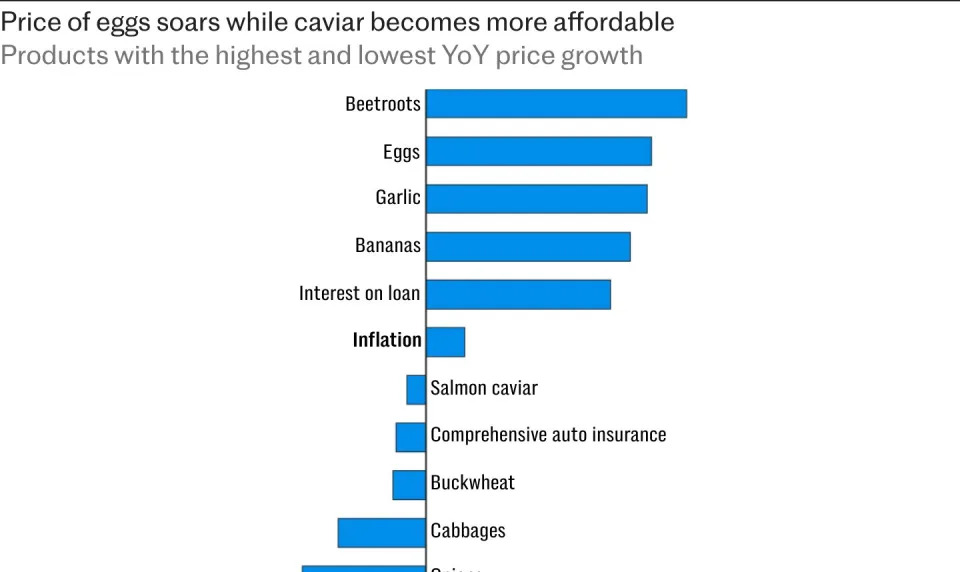
Russia butter
The Telegraph: Russian butter prices are surging as Vladimir Putin prioritises defence spending over protecting his country from the impact of sanctions.
The price of a block of butter has climbed by a quarter since last year, significantly higher than the inflation rate of 8.6pc, official statistics show.
Surging prices have sparked supermarket thefts, while shortages have also become widespread.
Western sanctions have pushed up prices on a range of goods and services. Putin has also prioritised defence spending to fund his war in Ukraine over insulating his population from the impact of sanctions.
Draft documents in September showed the Kremlin’s plans to raise defence spending by a quarter in 2025 to 6.3pc of national income, which would be the highest share since the Cold War.
The surge in butter prices over the past year has led to increased security measures at supermarkets following a rise in shoplifting, with Russian media reporting that retailers have started putting blocks of butter inside locked plastic containers to deter thieves.
Russia’s central bank recently warned that prices were likely to keep rising.
“Prices for dairy products, especially butter, continued to rise faster in September. Increased cost pressures continued to pass through to prices for this category of goods,” it said in a report on consumer prices.
Soyuzmoloko, which represents Russia’s dairy producers, has blamed high production costs, as well as increased demand for ice cream and cheese for driving up butter prices.
However, Russia is also feeling the effects of a slump in imports. Butter imports from Latin America have fallen from 25,000 tons a decade ago to 2,800 tons this year, according to agricultural regulator Rosselkhoznadzor.
Officials have blamed Western sanctions, with Rosselkhoznadzor saying the slump “may be related to transport and logistics issues, sanctions and the lack of agreements between businesses.”
Russia is struggling to find new supply routes to compensate for wartime shortages. Last month the country began importing butter from the United Arab Emirates (UAE) and Turkey.
Surging butter prices threaten to become a political headache for Putin. Food shortages and price rises have already sparked widespread anger.
A year ago, Putin issued a rare public apology after outcry over the price of eggs, which have climbed by more than 50pc since 2022 when Russia first invaded Ukraine. Last year, shops started selling eggs individually amid concerns about affordability.

While butter has become the latest symbol of Russia’s inflation woes, other prices are rising even faster. Potato prices are up 50pc and garlic has risen by 30pc.
The price of toothpaste is up 45pc, while car prices are also up by more than 40pc, according to Russian central bank data.
By contrast, the price of buckwheat, a Russian staple, has fallen 30pc since Russia’s invasion, providing some respite for families.
There are also signs that food scarcity is having a wider impact.
Analysis published by Russia’s central bank shows that in the year to September, the fastest inflation recorded was for the medication Bisacodyl, prices have more than doubled over the past year. The drug is commonly used as a laxative to treat constipation.
It is not the first time the price of butter has proved to be a politically charged issue. Historical butter shortages have hit the headlines in other countries, including in Norway in 2011 and France in 2017.
In both cases, a desire to protect the domestic market or fix prices backfired when bad weather resulted in shortages.
This led to “smør-panik”, or butter panic, in Norway as prices shot up above £30 and what was dubbed a “crise de beurre” in France as producers chose to export their supplies rather than sell them at the cheaper, fixed prices, leading to empty shelves.












Leave a review